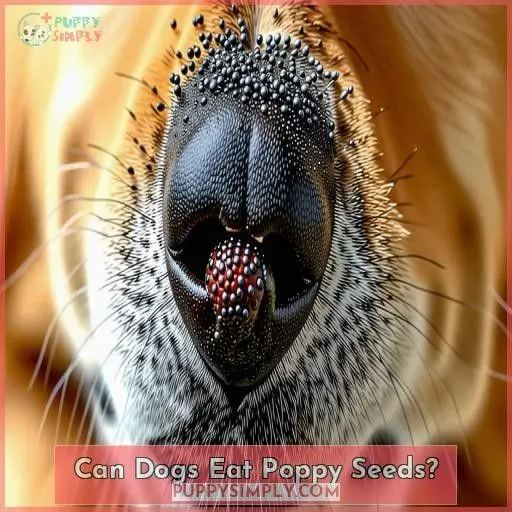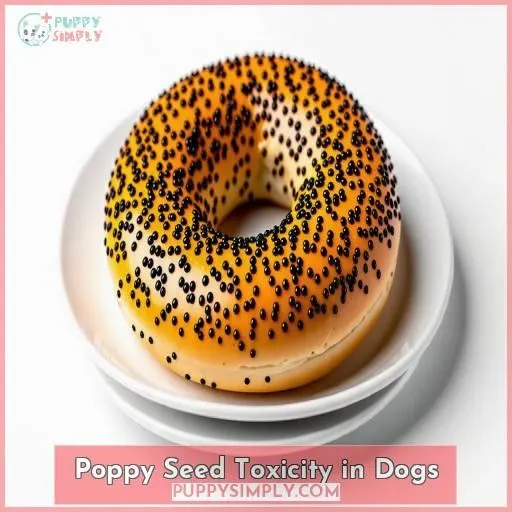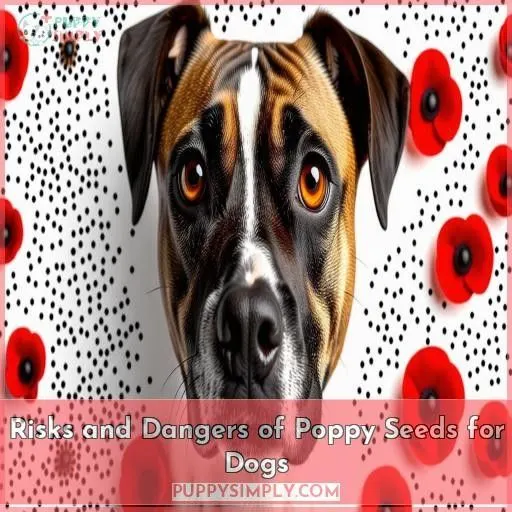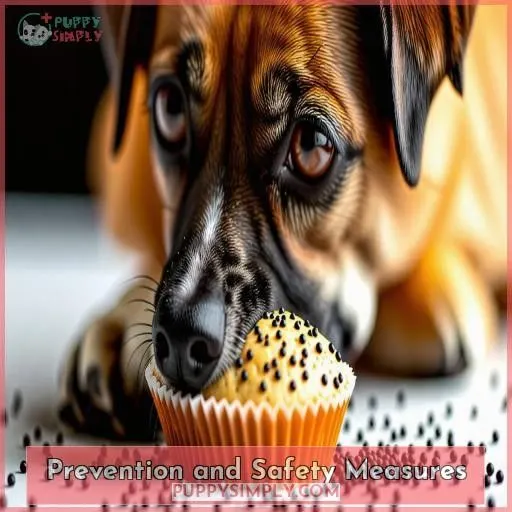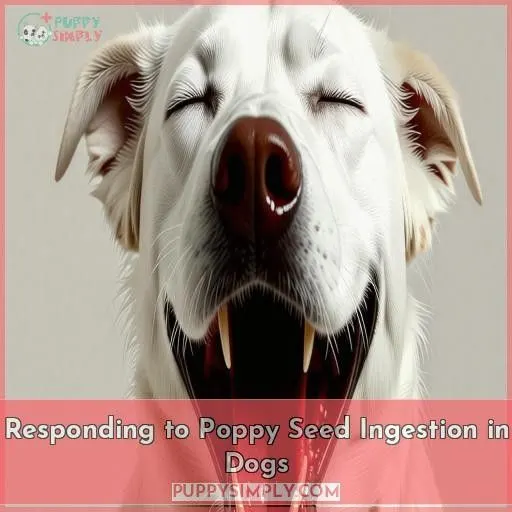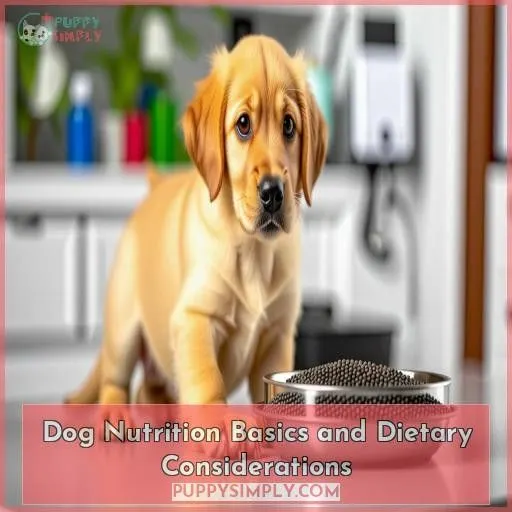This site is supported by our readers. We may earn a commission, at no cost to you, if you purchase through links.
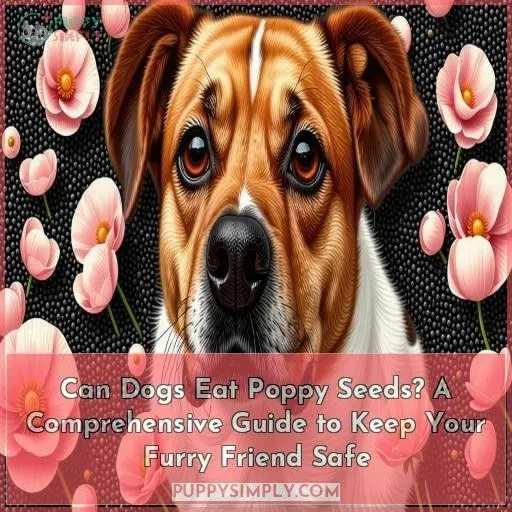 You should never feed your dog poppy seeds as they can be highly toxic and potentially life-threatening.
You should never feed your dog poppy seeds as they can be highly toxic and potentially life-threatening.
While poppy seeds may seem like a harmless addition to your pup’s diet, they contain compounds that can cause severe symptoms like vomiting, lethargy, and even respiratory failure in dogs.
It’s vital to keep poppy seeds out of reach, supervise your furry friend around food, and educate yourself on toxic foods.
If your dog accidentally ingests poppy seeds, contact your vet immediately for guidance on inducing vomiting and providing supportive care.
Prioritizing your dog’s safety by avoiding poppy seeds altogether is the best approach – but you’ll learn more about managing this risk by continuing.
Table Of Contents
- Key Takeaways
- Can Dogs Eat Poppy Seeds?
- Poppy Seed Toxicity in Dogs
- Risks and Dangers of Poppy Seeds for Dogs
- Prevention and Safety Measures
- Responding to Poppy Seed Ingestion in Dogs
- Dog Nutrition Basics and Dietary Considerations
- Frequently Asked Questions (FAQs)
- What happens if a dog eats poppy seeds?
- Can my dog have poppy seed bread?
- What seeds are toxic to dogs?
- Are some poppy seeds poisonous?
- How long after eating poppy seeds would a dog show signs?
- Is there a specific treatment for poppy seed toxicity in dogs?
- What is the fatal dose of poppy seeds for dogs?
- Can poppy seeds cause long-term health issues in dogs?
- Are some dog breeds more susceptible to poppy seed toxicity?
- Conclusion
Key Takeaways
- Poppy seeds may seem like a harmless little garnish, but they’re a big no-no for our furry friends. Think of them like tiny landmines that could trigger some serious tummy troubles or even respiratory distress if Fido gobbles them up.
- If your pup has taken a bite of the forbidden poppy seed, don’t panic – but do act fast! Give your trusty vet a call and follow their advice to the letter, whether it’s inducing vomiting, activating some charcoal, or just monitoring for any worrying symptoms.
- Prevention is key when it comes to keeping your canine companion safe from the perils of poppy seeds. Stash those poppy-laden treats in a pup-proof pantry, and keep a watchful eye on your furry bestie during mealtimes – it’s like playing a game of keep-away, but with much higher stakes!
- At the end of the day, it’s just not worth risking your pup’s health for a sprinkle of those tiny black seeds. Stick to tried-and-true doggy delights, and your four-legged pal will be wagging their tail with gratitude (and good digestion!).
Can Dogs Eat Poppy Seeds?
No, dogs shouldn’t eat poppy seeds or any foods containing them, like poppy seed pastries, bread, muffins, bagels, or pancakes.
While a small amount may not cause issues, poppy seeds can be toxic to dogs if ingested in larger quantities. The seeds contain narcotic substances that can lead to poppy seed poisoning, causing symptoms like changes in appetite, behavior, and pupil size, as well as sedation and respiratory failure in severe cases.
To keep your furry friend safe, always keep poppy seed-containing foods out of reach and supervise your dog around food. If you suspect your dog has eaten poppy seeds, contact your veterinarian immediately for guidance.
Poppy Seed Toxicity in Dogs
If your dog has ingested poppy seeds, it’s imperative to be aware of the potential symptoms of toxicity. These include vomiting, diarrhea, lethargy, depression, and constricted pupils, indicating your furry friend may have developed poppy seed poisoning.
Symptoms of Poppy Seed Poisoning
Poppy seed poisoning in dogs causes vomiting, diarrhea, lethargy, depression, and constricted pupils. Seek immediate veterinary care if your dog ingests poppy seeds. Supportive treatment and monitoring are essential for recovery.
The Cause of Poppy Seed Poisoning
Poppy seeds contain alkaloids like morphine, codeine, and thebaine, which can cause opium poppy toxicity in dogs, affecting their nervous system. Avoid feeding poppy seeds to keep your furry friend safe.
Diagnosis & Treatment of Poppy Seed Poisoning
If your dog ingests poppy seeds, contact your vet immediately. They’ll induce vomiting, administer activated charcoal, provide fluids, and monitor for complications like slow heart rate or respiratory issues. Avoid home remedies and never give poppy seed derivatives.
Risks and Dangers of Poppy Seeds for Dogs
Poppy seeds can have adverse effects on dogs due to the alkaloids they contain, which can cause poppy poisoning.
Even small amounts can lead to symptoms like changes in appetite, behavior, pupil size, sedation, and respiratory issues, indicating potential toxicity.
If a dog ingests poppy seeds, it’s imperative to contact a veterinarian immediately.
Inducing vomiting, administering activated charcoal, and providing supportive care are essential steps.
Always monitor for side effects and be aware of the potential dangers associated with poppy seeds to ensure your dog’s safety and well-being.
Educating yourself about poppy seed toxicity and being proactive can help you keep your furry friend out of harm’s way.
Prevention and Safety Measures
To prevent potential poppy seed toxicity in your furry companion, it’s essential to keep all poppy seed-containing foods and items securely stored and out of reach. Educating yourself, family members, and caretakers about the risks associated with poppy seeds and other toxic foods for dogs is a critical step towards ensuring your dog’s safety and well-being.
Keeping Poppy Seeds Out of Reach
Safely store poppy seeds out of reach of pets and toddlers in pet-proof containers to prevent accidental ingestion and potential choking hazards. Always supervise pets around food.
Educating About Toxic Foods
Educate yourself on toxic foods like poppy seeds to keep your dog safe. Avoid poppy seed contamination by learning about cultivation and distribution.
Supervising Dogs Around Food
Supervise your dog during meals to prevent accidental poppy seed ingestion. Use dog obedience training for safe, supervised feeding to avoid health risks.
Potential Contamination Awareness
To prevent poppy seed contamination, regularly supervise pets around food, educate yourself on product labeling, be aware of hidden poppy seeds, and avoid product cross-contamination. (Source)
Responding to Poppy Seed Ingestion in Dogs
If your dog has ingested poppy seeds, don’t panic, but act swiftly. Immediately contact your veterinarian and follow their guidance, which may include inducing vomiting, administering activated charcoal to absorb toxins, providing supportive care through fluids or medications, and closely monitoring for any adverse side effects.
Contacting a Veterinarian
If your dog ingests poppy seeds, contact your vet immediately for emergency care, monitoring protocol, and specialist referral if needed (Source).
Inducing Vomiting
After contacting a veterinarian, inducing emesis can help expel poppy seeds. Monitor for side effects and follow veterinary advice. (Source)
Administering Activated Charcoal
If your dog ingested poppy seeds, activated charcoal can help absorb toxins. Administer under veterinary guidance for safe, effective overdose management.
Providing Supportive Care
Provide fluids, anti-nausea medication, and supportive care as needed to help your dog recover from poppy seed ingestion .
Monitoring for Side Effects
Monitor your dog closely for side effects like vomiting, diarrhea, lethargy, and breathing issues. Seek emergency vet care if symptoms worsen or persist.
Dog Nutrition Basics and Dietary Considerations
You should take care when considering whether dogs can consume poppy seeds, as they can potentially cause toxicity. While poppy seeds aren’t inherently toxic in small amounts, excessive ingestion may lead to concerning symptoms that warrant prompt veterinary attention and supportive care.
Can Dogs Consume Poppy Seeds?
Dogs should avoid poppy seeds due to potential toxicity. Symptoms range from stomach upset to respiratory failure. Keep seeds out of reach for safety.
Poppy Seed Toxicity
Poppy seeds can be toxic to dogs, causing digestive issues and neurological problems. Avoid feeding them to your pup and choose safer dietary alternatives.
Symptoms and Treatment
Poppy seed ingestion can cause digestive tract damage. Supportive care, monitoring for dehydration and electrolyte imbalance are critical. Consult your vet for proper treatment.
Prevention and Care
Safely store poppy seed foods, offer healthy alternatives, train your dog, socialize them, and consult your vet to prevent poppy seed toxicity. Your dog’s wellbeing is top priority.
Frequently Asked Questions (FAQs)
What happens if a dog eats poppy seeds?
Ingesting poppy seeds can cause stomach upset or toxicity in dogs. Monitor for vomiting, lethargy, and changes in appetite. Seek veterinary care if symptoms arise, as high doses may require supportive treatment.
Can my dog have poppy seed bread?
While poppy seed bread seems harmless, it’s wise to avoid giving it to your furry friend. Excessive poppy seeds can lead to digestive issues and potential toxicity, though small amounts are generally safe. It’s best to stick to dog-friendly treats for your pup’s well-being.
What seeds are toxic to dogs?
Many seeds are toxic to dogs if ingested in large amounts. Some of the most dangerous include apple, cherry, peach, and plum pits or seeds which contain cyanide. Others like macadamia nuts and walnuts can also be highly toxic. Err on the side of caution with any seeds or nuts and keep them out of reach.
Are some poppy seeds poisonous?
Particular poppy seeds possess poisonous properties, piquing prudence. Popular pastries, however, purely pose paltry peril. Precaution prevails: prevent pups from problematic portions.
How long after eating poppy seeds would a dog show signs?
Signs like lethargy, vomiting, diarrhea typically appear within 12-24 hours after ingestion. Monitor closely, as large amounts can be toxic and require prompt veterinary care.
Is there a specific treatment for poppy seed toxicity in dogs?
Ever wondered how to treat a furry friend after a poppy seed indulgence? There’s no specific cure, but don’t panic – with supportive care like fluids and anti-nausea meds, your pup will bounce back.
What is the fatal dose of poppy seeds for dogs?
Poppy seed ingestion can be fatal for dogs at high doses, but the exact toxic amount varies. Consult your vet immediately if you suspect poppy seed toxicity.
Can poppy seeds cause long-term health issues in dogs?
Yes, poppy seeds could potentially lead to long-term health problems for dogs if ingested frequently or in large amounts. It’s best to avoid feeding them to your furry friend as a precaution.
Are some dog breeds more susceptible to poppy seed toxicity?
Some dog breeds may be more sensitive to poppy seed toxicity, but there’s limited research. Closely monitor all dogs after ingestion and contact your vet if you notice any concerning symptoms.
Conclusion
Ultimately, while tempting to allow your pup to indulge in a sprinkle of poppy seeds, the risks far outweigh any perceived benefits.
By adhering to the guidance in this thorough guide, you’ll safeguard your canine companion’s well-being, ensuring they avoid potentially toxic poppy seeds.
Equip yourself with knowledge, maintain vigilance, and remember – when it pertains to whether dogs can consume poppy seeds, the answer is an emphatic no.

